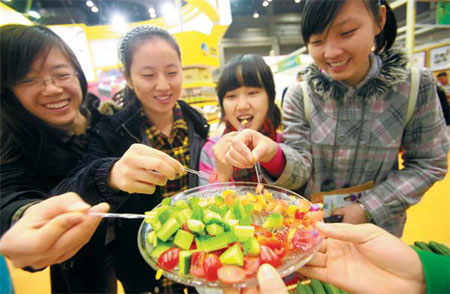Organic labeling can be food for thought
Updated: 2011-12-29 07:50
By Wu Wencong (China Daily)
|
|||||||||
|
People taste tomato and cucumber at the seventh China International Expo of Organic Food, held last month at the World Trade Center in Beijing. Although many vegetables sold at markets are labeled as organic, few have been certified. [Chen Xiaogen / for China Daily] |
Certificate of what?
One of the organizers of the fair is Chang Tianle, a project officer from the Institute of Agriculture and Trade Policy. She said they never claimed to be selling organic food there, that the term is used only to describe how the farmers adhere to organic standards and core ideas.
The fair is very careful in selecting farms to participate, she said. The food not only has to be free from chemical fertilizers, but also must be produced locally. "The certification bodies only conduct two supervisory visits every year," she said, so she doesn't place much stock in their evaluation.
As for complaints on the market's micro blog, Chang said the fair treats every customer complaint seriously and carefully: "So far, no suppliers have been discovered cheating."
As both a vendor and a consumer, Susie's mom also looks down her nose at the certificate. "I trust my own eyes more."
Luzhimeng has about 10 suppliers. Some are authorized farms, but most are not. Every week, the shop buys about 400 kg of vegetables, selling them at 16 yuan ($2.50) a kilogram to its 100 or so members.
There are some "open secrets" in the industry about which farms fake organic food that Susie's mom learned after becoming friends with a number of insiders. "Some non-governmental organizations also helped me to distinguish the real organic produce from the fake," she said. "I value the trust that exists between the suppliers and me more than the certificate."
Speaking at the first international summit related to the organic industry, Li Jianjun, director of the Teshi Circular Agriculture Farm in Taiyuan, Shanxi province, said the process lacks efficient supervision. "Even if a farm has been issued the certificate, it doesn't mean that all the produce is organic," Li said. "Maybe only a small section of a field or a single product has been certified."
Some farmers mix organic products with non-organic to ensure their income through greater yields, Li said. "Currently, we can only count on their consciences."
New standards
A senior staff member from one of China's 23 official certification bodies, who spoke on condition of anonymity, disclosed that a new national standard will be unveiled in March to ease the chaos. The standard will include four important changes from the original, in 2005. This staff member has been working in organic food certification for about eight years.
He said the first two changes will concern the transition period, akin to probation, when a farm applies for the certification of land. It lasts for 24 or 36 months, depending on the crops grown there, and farms must begin following organic practices three or four months before the transition period.
Under the current standard, as soon as farms enter the transition, they can obtain yellow certification, indicating their products are moving toward organic. Green certification is granted only if the farm passes probation.
"The problem with this stage is that, under the current standard, a farm can get a transition period certificate, even if it only stopped applying chemicals on the crops three or four months earlier," the senior staff member said.
Under revised procedures, no certificates will be issued in the first 12 months of transition. "That is to say, the farm will have to stop using chemicals for at least 15 months before it can receive a yellow certificate," he said.
Also, farmers will not be allowed to label their products "organic transition food", which has been used to denote food that was better than ordinary but not as good as organic. The staff member also said the new regulations will set the acceptable level of pesticide residue at zero. The current standard allows "one-20th of that found in ordinary food".
In addition, serial numbers will be introduced for each product. Consumers will be able to check with the body that authorized the product on the website of China's Certification and Accreditation Administration.











